Nowadays, there’s no alternative to having relevant, automatically updated information at our fingertips. And cloud-based customer relationship management (CRM) software is the backbone of that for businesses. If you want to provide a good customer experience, and therefore close more sales, every interaction that your customers have with your business needs to happen without error.
In this article, we’ll walk you through just why a cloud-based CRM is so beneficial, why it works well in particular for remote teams, and the features you should look for in a CRM software that’s right for you. You’ll also get a look at monday.com’s cloud CRM solution.
What is a cloud CRM?
A cloud CRM is a type of CRM system, solution, or tool that makes customer relationship management easier by making it possible to automatically and frequently update data and information for your entire team at once. Because it operates from the cloud, it can be accessed by anyone, from any device, at any time. This is crucial, as every employee that interacts with your customers — sales, marketing, customer service, finance, and others — needs to have updated and complete data on every customer at all times to provide a good customer experience.
When all teams are integrated under one cloud CRM solution, your CRM starts functioning as a CRM system. A CRM system allows you to manage the customer experience from start to finish. Because cloud-based CRM software makes that dream of easy management a reality for businesses of all sizes, they’re growing in popularity. In fact, spending on all cloud CRM software will reach $42 billion this year and represent 75% of CRM spend compared to on-premise solutions.
There are many popular cloud CRMs, and many businesses trust monday.com’s Work Operating System (OS) to build a custom cloud CRM that suits their unique needs.
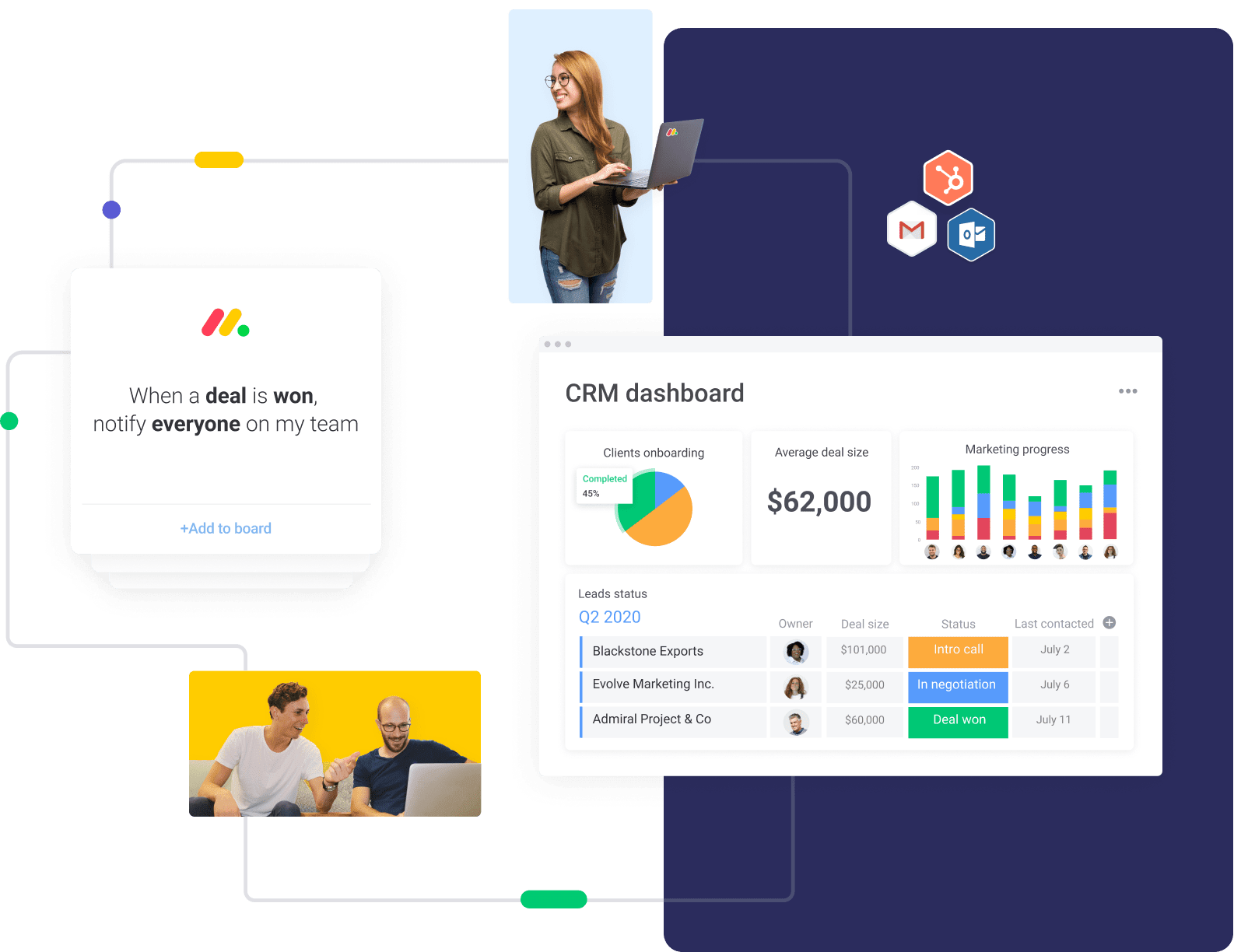
On-premise CRM vs cloud CRM
The main difference between an on-premise CRM and a cloud CRM is where the data is stored.
- On-premise CRMs store data in servers onsite accessed through a locally managed CRM application, which you’re required to maintain and update on your own.
- Cloud CRMs store data on a remote server, which your employees access using an internet connection. A service provider, like monday.com, frequently maintains and updates the CRM for you.
What are the benefits of a cloud CRM?
The benefits of using a cloud solution instead of one on-premise come down to maintenance, price, and access to frequently updated customer data.Deciding which provider is best for your needs can be challenging, so check out this review of the best cloud storage services. When you trust a cloud CRM provider with your customer data as opposed to managing storage yourself, you reap numerous benefits:
- No hardware maintenance: You don’t have to take care of servers or have to have staff to do so. You can also say goodbye to the up-front costs that come with purchasing servers and running them around the clock.
- Pay-as-you-go: No up-front costs for hardware mean that you can pay-as-you-go, which is especially appealing to many small businesses.
- Vendors manage upgrades: If any part of your software needs updating, or if you’re using features or functions that are out of date, you can work with your vendor to make that update.
- Vendors manage technical glitches: Found a problem? It’s not yours, it’s your vendor’s. You can work with their customer service to get it fixed.
- Vendors manage back-ups: Don’t worry about your data disappearing, as your vendor will frequently back up your database.
- Easy access to data from any device: Your employees can access data from a cloud CRM application on whatever device they’re using at the moment — their desktop, laptop, tablet, or mobile phone.
Cloud CRM: remote teams’ essential tool
The accessibility of a cloud CRM is especially useful for remote teams who aren’t often together in person to exchange updates or information around the proverbial office water cooler. A cloud CRM tops the watercooler by providing employees a space to give real-time and actionable updates as workflows progress.
Cloud CRMs are particularly beneficial for remote teams for the following reasons:
- Shared storage: Files aren’t stored locally on individual desktops, only to inevitably be shuffled around between emails. They’re all in one place, so no matter where you are in the world, you have the right version in front of you.
- Automated coordination between teams: Does your sales team need to know when your marketing automation tool sees high levels of engagement with a campaign? A cloud CRM makes updates like those automatic and seamless.
- Real-time data synchronization: Whether it’s new customer information, an update that a customer downloaded your new e-book, or an incoming customer service request, it’s all automatically recorded in your CRM in real-time for anyone, anywhere to see.
- Real-time data cleanup: Cloud computing reduces errors and data silos by deploying a cloud CRM that removes annoying duplicates from your system.
When teams across your remote organization all share the same dashboard, workflows progress smoothly, and productivity increases across the board.
Top features to look for in a cloud CRM
Hopefully, by now, you’re on board with the fact that a cloud CRM is the way to go. A flexible, customizable, and reliable solution will have the following features, allowing your teams to operate effectively no matter where they are.
Visual sales pipeline
One of the basic functions of a CRM is allowing sales teams to manage their pipelines. A good cloud CRM will allow you to easily see how your pipeline is progressing, with visual indicators that communicate where each opportunity is in your funnel. Without the ability to see where any specific opportunity is in your pipeline at a glance, your teams lose valuable time searching for the information they need.
monday.com allows teams to manage accounts and customers in any way that suits their needs, including indicators such as priority, deal size, and expected close date, by visualizing your sales pipeline with colors, like in our CRM template.
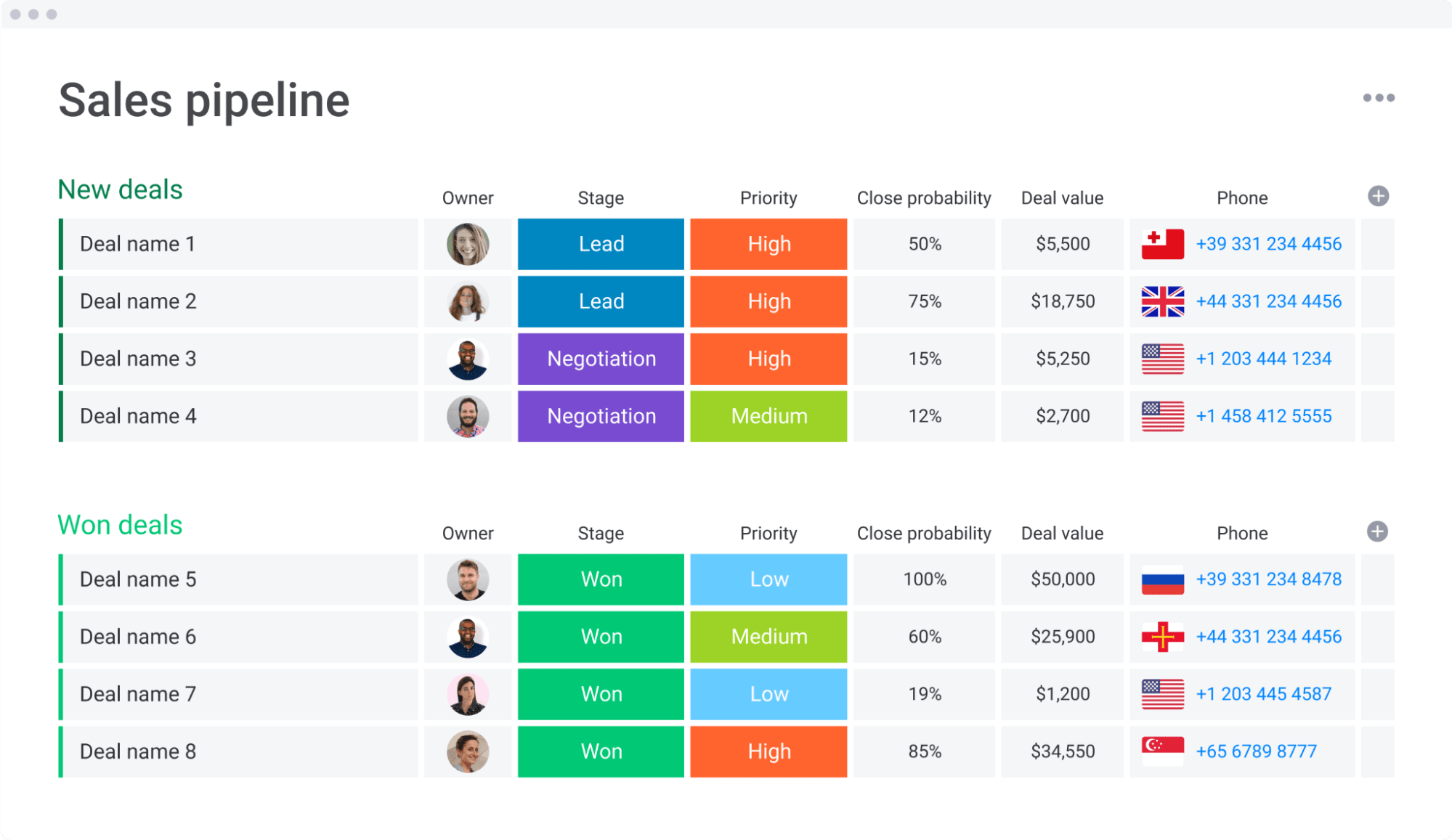
Centralize all of your data in one place
All data and information about your customers need to be in the same place. For example, sales teams shouldn’t be recording meetings in a different platform than marketing is using to track engagement with their email campaigns.
Imagine a salesperson at an enterprise technology company heading into a meeting with a new lead. That morning, the lead downloaded a customer case study related to personal finance. However, this information wasn’t recorded in the database used by the sales team, so that salesperson wasted that lead’s time asking questions about whether or not they were interested in their personal finance platform or credit card offering.
When all customer data and information are synced with one platform, customer experience improves across the board. With monday.com, teams track all contact information in one place, including documents, communications, status updates, and more.
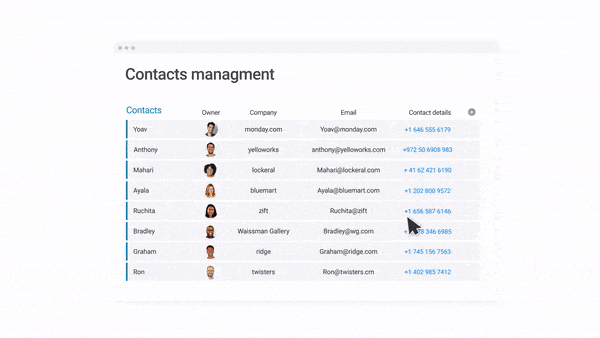
Customize dashboards
The data stored within your cloud CRM is valuable for a variety of reasons. That database can provide insight into your pipeline and revenue, but you can also analyze workloads, workflows, team member performance, and much more.
monday.com dashboards allow you to view progress towards your goals in whatever way makes the most sense for your team — by region, team member, product, or any other parameter. Different views offer different ways to visualize your data, so each member can view the same data in whichever way makes the most sense for them.
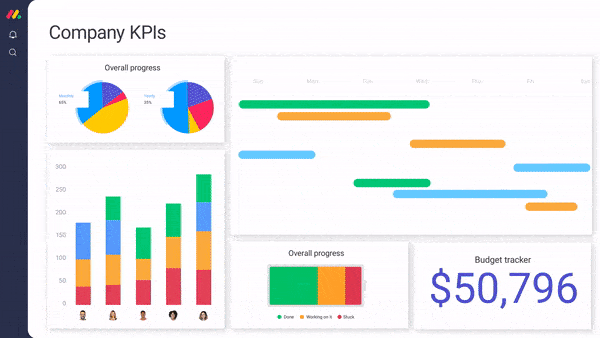
Automation and integration
While it would be nice if every team would engage fully with the same tool, sometimes it’s necessary for teams to operate using separate software. Your cloud CRM should be able to integrate with all of these tools, automatically updating data and information from all teams within your organization so that your CRM acts as the source of truth for your teams.
monday sales CRM integrates with hundreds of tools, including Zapier, which allows you to integrate with thousands of tools from countries across the globe.
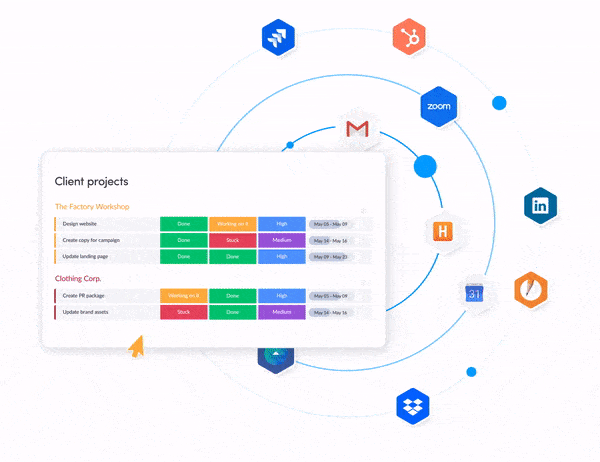
To take it a step further, monday.com allows you to automate status updates, notifications, email sends, and more based on interactions within the platform and with other integrated tools. For example, integrate monday.com with Mailchimp so that your sales teams know when an email campaign was sent, or notify account managers automatically when their client’s contract signed in DocuSign is about to expire.
By integrating with tools your teams are already using, monday.com closes the gap that’s often left by miscommunication or human error.
Choose a cloud CRM for a big impact on your customer experience
If you’re still using an on-premise CRM, you’re probably using cumbersome, outdated tech that’s not giving your teams access to all of the data they need, especially if you employ remote workers. The right cloud CRM solution could drastically improve your customer satisfaction by providing all business teams with the information they need at their fingertips when it’s time to communicate with a customer.
Look for a cloud CRM that can offer you a visual pipeline, customizable content management and dashboards, and automations that integrate with the tools you already use. If you’re looking for something that’s much more powerful than your average CRM and connects workflows and teams across your organization seamlessly, check out monday.com.

